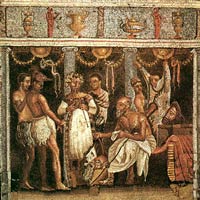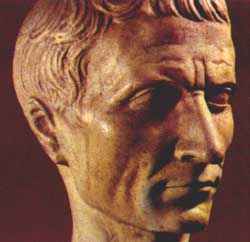Caesar's consulship
 However, Caesar's consulship was secure, and in december 60 he was elected to the highest office in the Roman Republic. His colleague was Bibulus, one of the optimates. Some of the measures Caesar and Bibulus took were the publication of the proceedings of the Senate, a reorganization of the taxes, and a law against extortion. However, the two consuls were not on speaking terms, and at a certain moment Caesar had his partner driven from the Forum. Next day, Bibulus complained in the Senate, but Caesar's armed bodyguard made sure that no one dared to support the poor consul. Other acts were equally illegal: when Cato protested to one of Caesar's proposals, Caesar had him dragged from the Senate's building and taken off to prison.
However, Caesar's consulship was secure, and in december 60 he was elected to the highest office in the Roman Republic. His colleague was Bibulus, one of the optimates. Some of the measures Caesar and Bibulus took were the publication of the proceedings of the Senate, a reorganization of the taxes, and a law against extortion. However, the two consuls were not on speaking terms, and at a certain moment Caesar had his partner driven from the Forum. Next day, Bibulus complained in the Senate, but Caesar's armed bodyguard made sure that no one dared to support the poor consul. Other acts were equally illegal: when Cato protested to one of Caesar's proposals, Caesar had him dragged from the Senate's building and taken off to prison.
Usually, the senate (i.e., the optimates) assigned a province to each consul, where they were supposed to fight wars. Since Caesar's opponents were afraid of him, the senators took care that provinces of the smallest importance would be assigned to the newly elected consul: they could not run the risk of letting Caesar secure a province involving the command of an army.
59, Caesar counteracted by forming the so-called triumvirate, or, to use the more adequate term that was coined by the historian Livy (59 BCE - 17 CE), a conspiracy between the three leading citizens. The other two citizens implied in the conspiracy were the rich banker Crassus and the generalissimo Gnaeus Pompeius, better known as Pompey.
Crassus had started as a colonel in Sulla's army, and had been able to make lots of money under his regime. In 72, as praetor, Crassus had suppressed the slave revolt of Spartacus. Later, he had been involved in the Catiline conspiracies. Caesar had already paid back his debt to Crassus, but still had some moral obligation to the man who had secured his profitable Spanish command.
Pompey was Rome's leading general. He had started his career in Sulla's army, had later suppressed a rising of followers of Marius in Spain and had co-operated with Crassus in finishing off Spartacus' revolt. Later, he had defeated the pirates, and after 66 he was given Lucullus' command against Mithridates. Pompey had defeated the king of Pontus decisively and had forced him to commit suicide; after this, Pompey had annexed Syria and invaded Palestine, where he had captured Jerusalem. His soldiers called him "Pompey the Great", and rightly so: he had doubled Rome's annual income and added vast territories to the empire. In 62, Pompey had returned, and was at odds with the Senate because of its tardiness in ratifying his organization of the East.
The triumvirate gave something to all its members. In the first place, they decided that no step should be taken in public affairs which did not suit any of the three conspirators; together, they would run the Republic. The deal was sealed by intermarriage: Pompey married Caesar's daughter Julia; Caesar married Calpurnia, whose father Piso had been a close friend of Crassus. Caesar saw to the swift ratification of Pompey's oriental acts. An agrarian law passed the Senate, distributing land among the urban poor and Pompey's soldiers.
Most important was a law on the provincial commands, which gave Caesar the provinces Cisalpine Gaul (i.e., the plains along the river Po), Illyricum (the Dalmatian coast), and Transalpine Gaul (the Provence) for the years 58-54. In these provinces, there were four legions. (A legion was an army unit of some 5,000 soldiers.) Protected by his office as a commander and by these troops, Caesar would be safe against his enemies.
Early in 58, Caesar left Rome; his father-in-law Piso, who was consul, took care of his affairs in the capital.
Roman chronology is basically the foundation of the entire edifice of global chronology. An imaginary foundation!
Despite its numerous gaps and inconsistencies, Roman history is the best-documented field of ancient history, and thus a reference scale of a paramount importance. But how well do we know the actual date of the city's foundation? The question makes more sense than it might seem to originally for several reasons.
Firstly, Rome is supposed to have been founded by the Trojans who had to flee after the fall of Troy. However, there are lots of different opinions as to when that happened exactly, and the datings offered are scattered over the range of five hundred years. Some claim Rome to have been founded by Aeneas and Ulysses shortly after Troy had fallen; others are of the opinion that there was an entire dynasty that ruled for 400 years between the fall of Troy and the foundation of Rome.
What do modern historians really say about the correct chronology of the Ancient Rome when they do not have to produce textbook-friendly output? The following: "Neither Diodorus nor Livy possess a correct chronology . . . we cannot trust the fasti, which tell us nothing about who was made consul in which year, or the cloth writings that led Licinius Marcus and Tubero to contradictory conclusions. The most trustworthy documentation is the kind that turns out to be much more recent forgeries after in-depth analysis".


|







